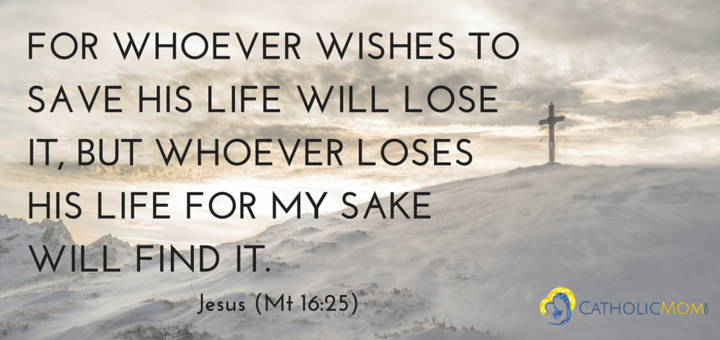
Why do we suffer? This is probably the most asked question, even if we don’t always ask it out loud. When we see suffering or experience it ourselves, many look up to God in agony and ask,
WHY?
Why them? Why me? Why, God, do You let this happen?
There is an answer – but it’s not one that we can immediately comprehend and there are no words to fully explain it. A priest recently shared some insights at a retreat I attended. According to him there are -
Three Main Reasons God Allows us to Suffer:
- It’s our own fault – natural consequences of our choices.
- Refiner’s Fire – we are refined so we can become stronger and know better what is important and what’s not.
- To Test us - like school tests that we can learn from.
Much of the suffering we see in the world can be traced back to someone’s or a group of people’s poor choices. As parents, this is something we see every day with our children. “If you touch the hot stove, it will burn your hand and you will experience pain.” Some kids learn the easy way by accepting and heeding our warning. Others learn the hard way and have to experience the sensation of pain for themselves before they accept our advice.
But what about those times when suffering comes into our lives by no direct fault of our own? Tragic accidents, illness and diseases, and plain poor “luck” so to say. Why does God allow us this type of suffering?
I have to confess that I really do not know the answer to that. I suppose on one level I understand that God allows tragedies and sufferings as some kind of indirect consequence of Adam and Eve’s original free-willed choice to turn against God thus casting us out of the perfection of Eden and out into a world of “toil and hard work.”
Still, I admit when I see and hear about horrendous afflictions and personal tragedies that people have to go through, especially innocent children, my heart grieves and my mind crumbles in confusion and sorrow.
I know God is not some terrible Zeus-like character purposefully throwing down hard hail stones at us or filling our bodies with disease. Yet, I can’t fully understand why God allows suffering, though I had tried so hard for so long to come up with a logical answer. What I’m learning is that I focused for too long on the wrong question and that’s why I couldn’t find the right answer.
Since we can never fully understand why God allows suffering, the only question that really matters is,
How do We Respond to Suffering as Christians?
All too often, those who see suffering in others or become afflicted become filled with bitter anger and turn away from God. When this happens, they look for other ways to deal with pain and loss. In a homily titled The Problem of Suffering, Bishop Barron sets up three main non-Christian responses to suffering throughout human history centered on the stoics, Buddhism, and Plato’s philosophies.
- Detachment, the “it is what it is” attitude so I have to just go along with it.
- Bishop Barron explains that Buddhism’s first noble precept says, “All life is suffering” and, “…through meditation and negation of the self, we blow out the candle of desire" - stop desiring [and] you stop suffering.
- Escape - rise above this world, run away and escape what makes you suffer and then you simply won’t suffer anymore.
I know when I experience pain or see others in pain, I see all three of these responses in action. What I’ve learned each time is detaching from my suffering, trying to meditate my way out of it, and definitely running away from it never bring me true peace – and it still hurts in the end.
So many of us try and run away, ignore, or simply shrug our shoulders and give into despair when it comes to suffering – but it doesn’t make it go away.
So what is the answer? Is there a better way?
We, as a secular society, see suffering as a huge nuisance that rudely intrudes into our lives. But, just as Jesus knew there is a greater meaning to his suffering, He also knows there is a greater meaning to our suffering also.
The Only Way to Respond to Suffering is to Embrace it.
The only way to survive suffering peacefully is to accept it – not in a despairing tone – but in a spirit of love.
Another priest once told me, “the only way through our sins and our suffering is through our sins and our suffering.”
Embracing our suffering and entrusting ourselves and others fully into God’s Will does not take our pains away or suddenly make life easy-peasy-as-pie. We’ll still have illnesses, pains, and struggles. But, like my friend Jane suffering from a terribly painful autoimmune disease, if we use our suffering as a stepping stone or as a rope to Christ, then it will no longer be something terrible or something we want to run away from. We will look at suffering with new eyes and see it as the “eye of the needle” from which we pass from one world into a greater one than we can even imagine.
For whoever wishes to save his life will lose it, but whoever loses his life for my sake will find it.” THIS is the answer to all suffering. (Mt 16:25)
Copyright 2016 Erika Marie
Image copyright 2016 Erika Marie. All rights reserved.
About the Author

Erika Marie
Erika Marie is a simple Catholic, Wife, and Mama. She relishes snuggles and free time with her family and enjoys reading, writing, blogging, and has a slightly obsessive addiction to creating Canva graphics. Enjoy more reflections by Erika at her personal simplemama blog.


.png?width=1806&height=731&name=CatholicMom_hcfm_logo1_pos_871c_2728c%20(002).png)
Comments